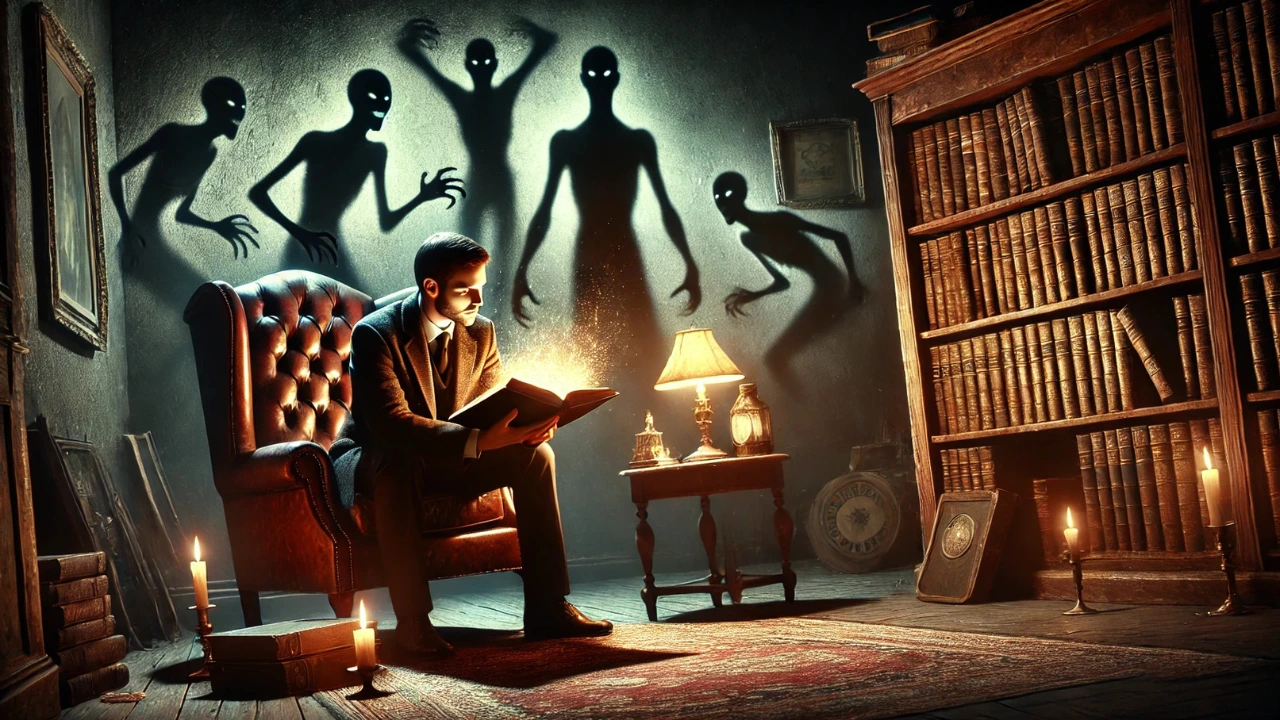The Shadow’s Script
The clock struck midnight as Edward Somerset reclined in his worn armchair, the faded leather creaking beneath him. A steaming cup of Earl Grey sat on the side table, its faint curls of vapour merging with the dim lamplight. The night was quiet, save for the occasional rustle of leaves against the windows of his modest cottage. Edward, a schoolteacher with a penchant for secondhand bookstores, had found a peculiar novel earlier that day. Its spine was unmarked, its cover a plain black, as if it were purposefully designed to be unremarkable.
He opened the book, curious but cautious. The first line struck him with eerie familiarity,
“The man leaned back in his chair, the scent of tea blending with the musty air of his solitary home.”
Edward frowned. The words felt like a mirror, reflecting the exact moment he was living. Dismissing it as a coincidence, he read on, the pages brittle beneath his fingertips.
The story followed a character named Edward—a teacher in his mid-thirties, living alone in a quiet village. Each scene mirrored his life with unsettling precision. The classroom, where chalk dust clung to the air; the shop where he bought groceries on Fridays; even the colour of his favourite scarf—a deep burgundy—was described in unnerving detail.
Edward felt his chest tighten. How could this be? His name wasn’t particularly rare, but the specifics were too exact to ignore. Yet, he convinced himself it was a harmless oddity, a prank or an obscure coincidence. He read on, unable to resist the pull of the narrative.
As the story progressed, Edward’s fictional counterpart began receiving anonymous letters. The handwriting was jagged, the words disjointed yet threatening: “You are being watched.”
Edward’s breath hitched. Just the day before, he’d found a note slipped under his door. It read: “The shadows know.” He had dismissed it as a joke, perhaps from one of his students playing a cruel prank. But now, the novel seemed to suggest otherwise.
The pages seemed to thrum in his hands as he continued. His tea went cold, forgotten, as the hours stretched into the early morning. The story revealed that the letters grew increasingly sinister, describing the character’s daily routine in detail—what he ate, where he walked, when he turned out the lights.
Edward’s unease turned to terror when he reached a passage recounting a moment from earlier that very evening,
“He picked up a plain black book, its cover as nondescript as a shadow in the dark. The man turned the pages, unaware he was reading the story of his own demise.”
The book slipped from his hands, hitting the floor with a dull thud. His heart hammered against his ribs. This was impossible. Impossible! Yet the truth pressed against him like the weight of a nightmare.
He stared at the book, reluctant to pick it up again but compelled by a force he couldn’t explain. Slowly, he retrieved it, his hands trembling.
The story grew darker. The Edward in the book began to sense a presence in his home—a faint creak of floorboards when no one should be there, a shadow shifting where none should fall. The tension built until the Edward in the story realized he wasn’t alone. A killer, the narrative claimed, was stalking him, biding their time.
Edward’s rational mind struggled to take control. This was a fiction. A coincidence. He was simply allowing paranoia to cloud his judgment. Yet, every instinct screamed at him to flee, to abandon the house and the accursed book.
And then, a noise shattered the stillness—a faint scraping, like nails dragging along wood.
Edward froze. The sound came from the hallway just beyond the living room. Slowly, he placed the book on the table, straining to hear.
The scraping grew louder, more deliberate. His breath caught as he remembered the next part of the story, the words etched into his mind like a brand,
“The man, too frightened to move, sat paralyzed as the sound drew nearer. He didn’t notice the shadow stretching across the floor until it was too late.”
Edward’s eyes darted to the floor. A shadow indeed crept into the room, its shape elongated and unnatural, as if cast by something not wholly human. His limbs refused to obey as the shadow grew darker, more defined, until it seemed to solidify.
“Who’s there?” Edward croaked, his voice barely audible.
The shadow didn’t answer, but the scraping stopped. The silence that followed was more suffocating than any noise could have been.
Gathering his courage, Edward reached for the fireplace poker, his fingers curling around its cold, iron length. He rose, his knees trembling, and took a tentative step toward the hallway.
The air grew colder with each step, a biting chill that gnawed at his skin. The hallway stretched before him, its end swallowed by darkness. He hesitated, his grip tightening on the poker.
Suddenly, the lights flickered. For a brief moment, the hallway was illuminated—and he saw it.
A figure, tall and impossibly thin, stood at the far end. Its face was obscured, a void where features should have been. Its limbs were unnaturally long, the fingers tapering into points that gleamed like polished bone.
Edward stumbled back, his heart pounding as the lights went out completely. The darkness was absolute, pressing against him like a living thing.
He retreated to the living room, slamming the door shut behind him. His breaths came in shallow gasps as he pressed his back against the wood. The book lay open on the table, its pages illuminated by the flickering lamp.
Compelled by a morbid curiosity, Edward glanced at the text. The words seemed to ripple, rearranging themselves as he watched,
“You can’t escape. It’s already here.”
The door rattled against his back. Edward screamed, dropping the poker as he stumbled forward. The rattling ceased, replaced by a slow, deliberate knock.
He clutched the book, hurling it toward the door in a fit of panic. The knock stopped. For a moment, there was silence. Then, the voice came—a low, deep whisper that seemed to seep through the wood.
“Why run, Edward? The story always ends the same.”
Edward’s knees buckled. He scrambled toward the window, throwing it open with trembling hands. The cold night air hit his face as he climbed out, falling to the ground below. He ran, barefoot and desperate, the gravel biting into his soles.
Behind him, the house stood silent, its dark windows like unblinking eyes. Yet, as he fled into the night, the voice lingered in his mind, its words etched into his very soul,
“You can’t outrun a story, Edward. It’s written in the shadows.”
Days later, the police found Edward’s abandoned car on the outskirts of the village. The house was empty, save for a single black book resting on the living room table. Its pages were blank, except for one line scrawled in jagged handwriting,
“The man disappeared, but the story remained, waiting for the next reader.”

Syeda Izma Mashkoor is a passionate storyteller and rising literary talent. She is a gifted writer with an exceptional flair for storytelling. With a strong academic background in English and a natural creative spark, she has mastered the art of writing compelling stories that captivate readers worldwide. Specializing in horror, fables, and fantasy, Izma brings her stories to life with vivid imagination and deep social insight.
Beyond writing, she explores painting, crafting, and sketching, drawing inspiration from history and cinema. Her storytelling stands out for its ability to blend contemporary societal themes with engaging plots, making her work both thought-provoking and entertaining. Guided by her motto, “Talent without hard work is nothing,” Izma continues to push creative boundaries, leaving a lasting impact on the literary world.







